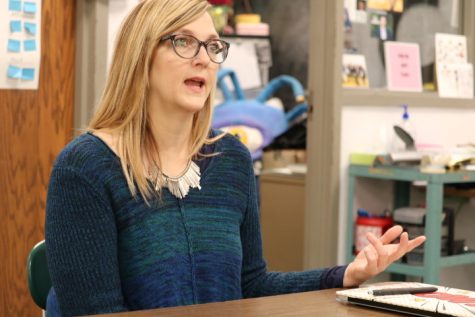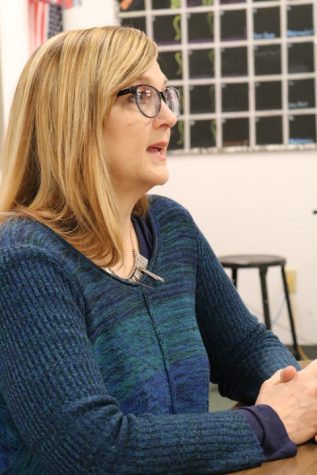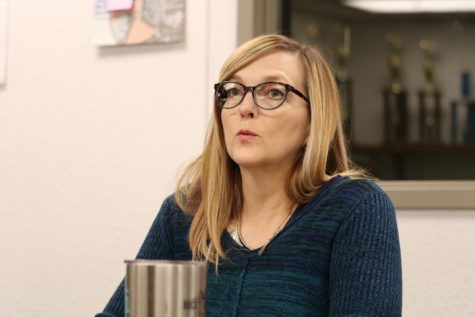Determining the State of Debate
November 3, 2018
Recently, I had a conversation with Norman North Debate coach Lori Crawford Wednesday, Oct. 31, in her classroom. Here is the written interview with the debate coach as well as some inside information as to what’s happening in the class.
M: How are you doing?
L: Good, how are you?
M: How do you think [debate is] this year?
L: I am really excited about this year. The thing about this year is that we have a fairly big group. I think right now we have about 46, 47 debaters. So that’s a pretty big group, and I’m very excited about that. We also, though, have mostly novices. In that group, I’d say ⅔ of the group to ¾ of the group, even, are brand new to debate. So that presents an idea where it’s very exciting because it means we are going to have a strong future, but we have students who have a lot to learn about debate. So we have a small core group of veteran debaters who have been doing this for a little while, and they may find success this year, and these novices may find success this year, but that’s not my focus. My focus right now is more about getting them more acclimated to debate, educating them about debate, giving them opportunities to practice debate, and I tell them all the time that debate is going to take about a year to really understand, to learn enough about it, to feel comfortable with it, to understand it, to know if you want to continue doing this or not.
M: How many students are in debate right now?
L: I have about 46 [to] 47 students in debate.
M: So… this is just something I’ve always wondered. What is practice like? What do you guys do?

A figure donned by debate as the “all-seeing eye” hides in the corner of head debate coach Lori Crawford’s office
L: Well we have two different events that we do and one of them is extemporaneous speaking and in this, they would draw for a topic and they would have thirty minutes to prepare. It’s a current events topic in the form of a question. They would have thirty minutes from the time that they drew this question out of an envelope to prepare a seven-minute speech on this topic, answering the topic question. That’s one type of event. And then another type of event would be debate, and then of course on that, we’re making argumentation on a predesignated topic. So we have different practice days based on those two events. So on an extemp practice day, people would be either coming in with pre-prepared speeches where they at home have taken the thirty minutes and prepared something in advance, or they may prepare it here on the spot in thirty minutes. Set a timer [for] thirty minutes, prep your speech, but basically, with that type of practice, we are pairing up either just with a partner or small groups, we’re giving our speeches to each other, and we’re critiquing each other. And then rewinding, doing all that again, prepping a new speech, getting another partner, giving the speech to someone else. With debate practice, a very similar idea, but we are Lincoln Douglass debaters. That’s individualized debate, so they’re pairing off and doing debate rounds, and then trading with someone else and doing another debate round. Same thing with the team debates. They’re getting another team, doing a debate round, switching off to another team, doing another debate round. So that’s how our practices run.
M: What is your favorite type of debate?
L: I get asked this all the time, and what I will tell you [is] I try to feel like I don’t really have a favorite type of debate, but it’s difficult not to. I will say that my students will think that I don’t like public forum debate, that I don’t respect public forum debate, and that’s not really accurate. I think public forum debate is the shortest one. It’s only about a 30-35 minute debate round, and it’s a little I guess simplified format, and it is a partnered debate and they don’t have to defend some of the types of argumentation that you would do, in say, policy debate like critical argumentation. So I have a lot of kids that will try to default to that because they perceive it to be easier. That’s the part that I have a problem with with the debaters so because I say some things about public forum debate and students trying to take it as the easiest form of debate then they think I don’t respect it. I do respect it when it’s done well. I do enjoy it when it’s done well. It should take just as much preparation and focus as any of the types of debate.

Debate coach Lori Crawford talks in front of the “all-seeing eye”
I would say I also… policy debate is sort of an elite form of debate. There aren’t as many people doing that because it’s very intense. The rounds take an hour and a half to get through an entire debate round. There are lots of speeches; there’s a lot of intensity to it. A lot of preparation and research has to go into it, or you’re just going to get decimated. So I enjoy that one. But if I had to pick a favorite, I would probably say Lincoln-Douglass debate. That is the most philosophical type of debate; it’s a moral-ethical type of debate. It’s an individual one-on-one debate, and because we have that philosophical framework, there’s something about that I just really enjoy. Kind of philosophy v. philosophy type of debate, so I guess I would pick that one.
M: Yeah, I’ve always liked that one too.
L: Yeah, policy… sometimes it brings in philosophy but it tends to default to a lot of, like, evidence vs. evidence type of thing most of the time, and I just enjoy philosophy vs. philosophy a little more.
M: What is the preferred type among students?
L: Public forum (laughs). This is for the reasons I said before. It does make a nice type for novices to get started with because it is shorter. I will say that policy debate takes an hour and a half to do; it is intense. I’ve had novices try it and just get really exhausted by it. So when they’ve not done debate before and having to make it through when we go to a tournament they’re going to have to do at least three preliminary rounds on a Friday night, and so back to back, three rounds of an hour and a half each can seem very intense to, you know, say a freshman, or a first time debater so I would say that most people would try public forum first and then they might stay with public forum or they might delve into one of the other types after they’ve gotten used to debate so I would say most debaters, that’s where we have most of our members. In public forum debate.
M: What upcoming events are you looking forward as far as debate goes?
L: Gosh, that’s hard to say. Well, we have our first tournament coming up this weekend. So that’s always really exciting going to the first tournament of the season. Usually, everyone on your team goes. So we have almost – you know we have a couple of people who can’t go for various reasons – but almost our entire team will go this weekend that always a very exciting tournament. It’s also going to be a huge learning curve for all of my novices, so that’s something I’m looking forward to. It’s hard for it to become really real to them until they get to their first tournament. So that is exciting.
We also have a tournament that we will be hosting at the end of February, so gearing up for that is always a really exciting time. And then of course, when you have your post-qualifying season going into regionals and state, and districts is the tournament that qualifies us for nationals. Those are always really exciting times.
M: When students are debating, how are they judged, and do you think the judges are always fair or do you guys like to get to know them and appeal to their personal preferences?

For head debate coach Lori Crawford, getting to know the judges is as important as the debate.
L: Definitely a huge part of debate is judge preference. Like you really do need to know who your judges are to the best of your ability. Some of them will post what we call paradigms, and that’s just their preferences in judging. Some of them will post those preferences online and then students can look at them but if it’s not a judge that judges on the national circuit they probably don’t have a posted paradigm and so it’s just up to the students to try and get to know that judge. If they get the judge more than once at tournaments, they start to figure out what the judge wants. Another thing that they do is ask the judge at the beginning of the round, “do you have any paradigms that you could share with us,” and then that gives the judge an opportunity to tell the students what their preferences would be. It’s called judge adaptation; the students really have to adapt to what that judge wants, because if they don’t, they could get voted down. They might have good argumentation, good logical reasoning; they would get voted down just because they’ve not met that judges standard, whatever that judge is looking for, and it is subjective to a certain degree. So that’s definitely a huge part of debate, and I think it’s a great life skill. Adaptation is a great life skill. It’s good for if you go into sales, it’s good for if you’re going into the corporate world, it’s good if you’re going to go into any sort of public speaking or needing to convince clients or anything like that. So it’s a great skill.
The type of judge you will get for the different types of debates will be different. So for policy debate, where it is a very specialized type of debate where you need to come in with a lot of knowledge of the topic and the debate form itself, you will get expert judges. So in policy debate, you’ll get to know them very well. It’s a smaller debate community, smaller numbers that debate in policy, and so you’ll get those judges again and again, and you’ll really start to figure out what they want, and they have to be expert judges. There’s just no way around it.
With Lincoln-Douglass, you’re going to get some expert judges and some parents or people who have just graduated from high school that used to do debate and things like that.
Public forum, the whole design of public forum debate is the public aspect of that. So with that type of debate, you should be debating in a way that you could be in a public arena, and anyone could understand the argumentation that you’re making. So the judge for that is supposed to be a lay judge. It’s supposed to be someone who’s not specialized in debate or the topic; they just make a decision based on who convinces them the best.
Now, of course, because coaches are coming and former debaters are coming to judge, you may get someone that really does understand it better and is sort of an expert judge. But you’ll also get people’s parents that have never judged debate before and don’t know anything about the topic coming in, and that’s really what it was designed for.
M: Do you have any students that are returning tournament or championship debaters?
L: I have some students that did really well last year, but we did not go to state last year. Norman High and Norman North chose not to attend state last year because it was during the teacher walkout. So I don’t have any state champions currently because of that aspect. I am very confident that I would have had some students in debate and extemp that would’ve been at least in the finals at state. I do have a student who went to nationals last year in policy debate, and that’s Andrew Gafford. His partner was a senior last year. Brandon Rogers graduated, so all of the students that went with me to nationals last year were seniors and graduated, except for Andrew Gafford. So he’s my returning championship debater.
M: So you said that Norman High and Norman North chose not to attend state because of the teacher walkout. So that was April, and so the first question on that [would be] was that you guys that made the decision or was that upper management, in this case like a principle a secretary, something like that or was that you guys?
L: The four coaches among Norman North and Norman High made the decision. So the administration gave us the ability to make that decision. They said we could take kids to state during the walkout if we wanted or we could choose to not go and so we discussed that with our students and the students were really overwhelmingly in favor of us not attending state not because they didn’t want to because as I said I had some real contenders that would have definitely been in finals if not I probably had the domestic extemporaneous state champion because I had a solid lineup I had the regional champion, Brandon Rogers, abut those same students who knew that they probably would end up in state finals in their events were the very one that said “I think that this is a very important political moment, and I don’t think that we should attend.” It was actually the debate coach at Norman High that got this discussion going that was advocating for this and the speech and drama teacher there Amanda Jensen, and Mr. Ryan here – they were all very adamant that we take this stance. So what we did instead was had our students go to the capitol building the Friday that we would’ve been at state. We had our students come to the state capitol with us, we went to the fourth floor, and they performed their state pieces that they would have done, and we were joined there by the Deer Creek speech team, the Edmond Santa Fe speech team, and I think that was it.
M: So you guys debated at the capitol instead of at state?
L: Right.
M: Apart from debate, what other classes do you teach and how are those going?
L: I teach speech and communications and I have one film is literature section. I really enjoy the speech and communications class. It’s an opportunity for me to work with students on rhetoric and public speaking without the competitive aspect. I do enjoy the competitive aspect, but sometimes it’s nice just to be able to talk about it and practice it without the push to get ready for a competition. I really really enjoy that. The film is literature class… I mean… I’m not sure who wouldn’t, you know, enjoy the film is literature class. I have a great deal of fun in there talking about some different film aspects with those students.
M: Taking everything you do here into account, do you ever feel any stress, and if so, does it affect your attitude towards teaching?

Mrs. Crawford delves into the stress of her several teaching jobs
L: To be honest, there are times that I do feel a lot of stress and a lot of pressure. For example, we just got finished with a one-act competition, and that’s something that I also do here at North. We got to state – We were regional champions, and we got to state. The judges didn’t love us as much at state as they did at regionals, so there’s just… you know, doing that, I don’t have a class for that, I’m just doing that along with the debate class, speech, and communications, and film is literature, so we’re practicing after school for debate, we’re p[racticing after school for one-act play. We also have a middle school program, so Longfellow and Whittier send middle schoolers over here on Wednesdays to work with us. So it can get stressful trying to juggle all of that. The way that I view myself is as a hub of a wheel that turns. I have to try to be careful to satay that hub, and I’m good at being that hub if I’ll just stay the person who’s facilitating and organizing everything. When I try to get out and be too many of the spokes in that wheel, that’s when it starts to come off of the axle, so to speak. But I’m good at being the facilitator and keeping all of these different aspects of the program turning. So even though it can be a little stressful, I do enjoy it.
